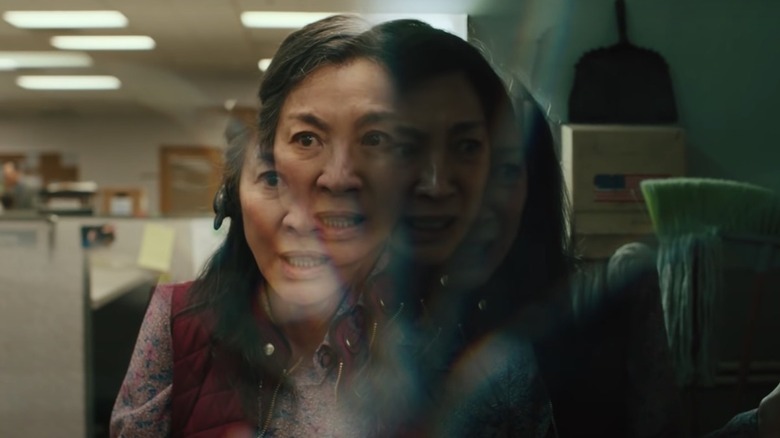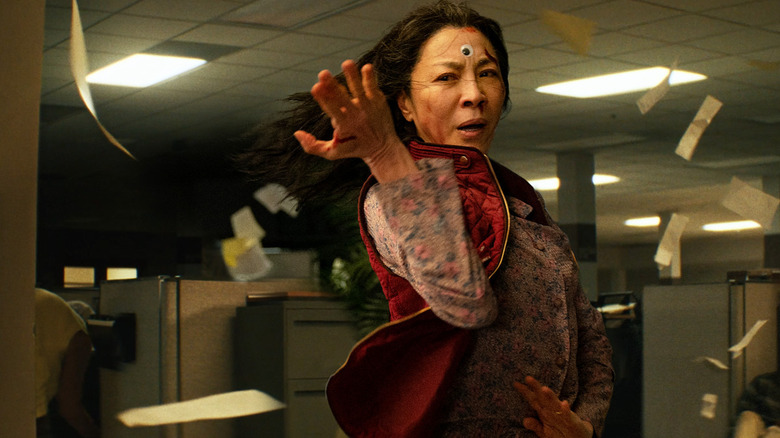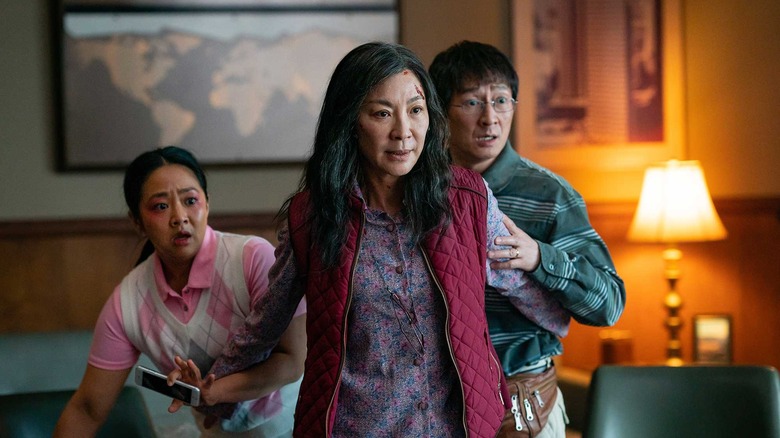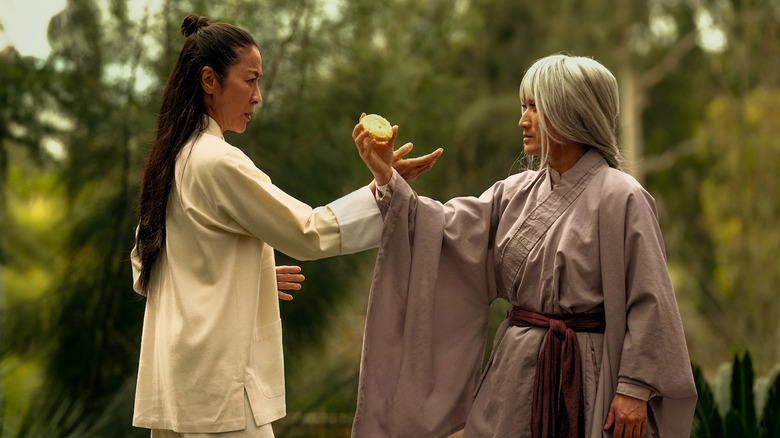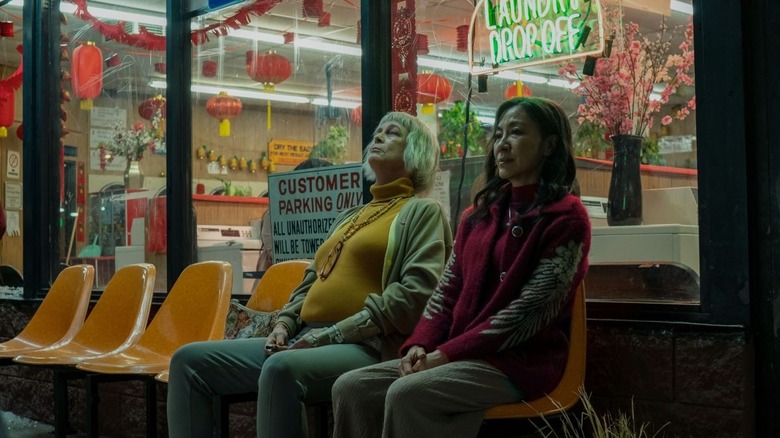The Daniels Know That Being On The Internet Is Like Everything Everywhere All At Once [Interview]
Speaking to the Daniels is a little like watching "Everything Everywhere All At Once." The directing duo, composed of Daniel Scheinert and Dan Kwan, are excitable lovers of movies, pop culture, and everything in between, often interrupting each other and going off on colorful tangents that give just a tiny glimpse of how their wild brains work. They have so much to talk about, and honestly, it's hard to resist joining in on their chatter — geeking out about cinema legends Michelle Yeoh or James Hong, or enthusiastically agreeing that the internet is just the pits. You can practically hear the little computer pings as the Daniels happily take your conversation down the strangest and funniest roads.
It's like your synapses are all firing at once, and I was reminded of sitting in front of "Everything Everywhere All At Once," Daniels' absurd, gonzo, sweet, silly, sad sci-fi flick. It's a maximalist depiction of living in today's nihilistic, anxiety-filled world, and a surprisingly compassionate knife that cuts through the noise.
"That's what living today is like," Kwan said. "That's what talking on Twitter is like."
It's everything, everywhere, all at once. The movie has so much to say, and a 15-minute conversation with the Daniels felt like we barely scratched the surface. But, perhaps that's fitting, too, as Kwan pointed out that "Everything Everywhere All At Once" is about that feeling of falling behind, and embracing the idea that that's okay.
"The life cycle of the movie is years. The life cycle of the internet is, like, milliseconds," Kwan said. "And so our stories are kind of failing to keep up. This movie is an attempt to tackle all of that, in a way that combines the smallest things and the biggest things."
I spoke with the Daniels about hot dogs, Michelle Yeoh, Marvel, and what it's like to exist on the internet ahead of the release of "Everything Everywhere All At Once."
'One of the things we started to do with the universe is we'd start to write things just for ourselves and be like: What if?'
Hi, thanks for speaking with me today. How are you guys?
Daniel Scheinert: We're doing good. A little tired. But just so excited, excited to talk to you. We're /Film readers.
Are you really? That's so cool. Thank you. I'm a big fan of your guys' work, obviously.
Dan Kwan: Yeah. Thank you. Yeah. I remember in college this was the first film podcast I got into, was the /Film podcast. And I would, as I was interning, I used to intern at DreamWorks Animation. Sometimes I'd be doing some mindless work, so I just ... your podcast was always on while I was working there.
Scheinert: Mm-hmm (affirmative).
Oh my gosh. Well, thank you for speaking with me and telling me about that because yeah ... /Film, awesome place. Okay. Well, let's talk about "Everything Everywhere All at Once." And how do we start about it? I can't think of anyone better to lead this movie than Michelle Yeoh, who is so malleable and magnetic in it. But she's a global superstar. How did you get Michelle Yeoh for your absurd arthouse, sci-fi flick?
Scheinert: We're lucky.
Kwan: I think one of the things we started to do with the universe is we'd start to write things just for ourselves and be like: What if? I dare the universe to let us make this. And even on the small scale of our music videos, we'd be like, I dare the universe to let us make this music video, like "Turn Down For What," I dared them. I dared the label to say yes to this. And so, we didn't know Michelle Yeoh, we didn't know if she was the kind of person who would respond to something like this. Because most of us, we've seen her our whole lives, and she's this very beautiful, regal person, who you would never think that she would say yes to some of this stuff. But we wrote it almost like a prayer to the universe being like, I dare you to give us Michelle Yeoh, or I dare you for the stars to align.
And they did. She read the script, and we met up with her, and she was just so lovely, and so not what I think most of us perceive her as. Yes, she is an icon, but also she's just so grounded ... the moment we sat down with her, she felt like an auntie, who was just like, wanted to feed us, wanted to make sure we're okay. Also wanted to make sure our heads were okay.
Scheinert: Yeah. Making fun of us.
Kwan: Yeah, exactly.
Scheinert: I think she liked the script a lot, but we liked each other a lot, you know? Just sitting down and chatting, it was like, "Oh man, this is going to be fun."
Kwan: Yeah.
Scheinert: She's weirder than people realize, you know?
'Once Michelle did something, every other crew member would be like, 'Well, Michelle Yeoh agreed to do that''
Yeah. I mean, obviously just doing the movie, she's got a weird bone in her.
Kwan: Oh, and she killed it every day. We knew she could do it, but we thought some of the pieces would be harder than others. But she surprised us every day, and I don't know, it was the ... people always talk about onscreen chemistry as being important. But I think for us, that offscreen chemistry was what made this whole thing grow, because we just all had so much trust in each other. I don't think you could have made the movie like this, without that trust.
Yeah. And I know that there's some elements of the script that Michelle Yeoh kind of balked at, like the hot dog fingers scenes. And you have a great cast for this movie, in addition to Michelle Yeoh. Were there any compromises, or sort of stop gaps, that you had to make to bring any of the other cast on board for your original script?
Scheinert: Not really. And even Michelle later, she told us that when we first met up, she was going to ask us to get rid of the hot dogs. I think we maybe just bulldozed her with confidence or something, because we never got around to talking about it. By the time we were filming, Jamie did her big hot dog scene first, because it gets pretty weird, and there's ketchup and mustard involved. So then, I think literally Jamie did it, and then she turned to Michelle and went, "Your turn." The whole crew burst into laughter, but that's sort of a metaphor of the whole shoot, that once Michelle did something, every other crew member would be like, "Well, Michelle Yeoh agreed to do that."
Kwan: "What else can I do?"
Scheinert: Yeah, "I'm a diva if I say no to anything." And like, "Oh my God, Jamie Lee Curtis just did that. Look at her outfit. I'm a diva if I say no."
Kwan: Yeah. There's two parts of the answer. It's that kind of communal energy that kind of gave everyone confidence, but also gave each other's feeling of competitive oneupmanship. But then, on the other hand, we've spent the last 10 years making really strange tonal experiments in our short films and music videos, and of course our first movie, which was "Swiss Army Man." We're really lucky that we just slowly built our budgets up a little bit every time, and just got our graces up just a little bit. So now we're at a point where people look at this movie and they go like, "How was it made?"
But I know how it was made. It took decades of slowly building trust. Now when people read our script, they have a whole reel of things to look through, to figure out whether or not it's going to work. And to Michelle's credit, she saw "Swiss Army Man," and was like, "I think we can make this work." And she jumped in. So on the one hand, it's crazy that it exists. But on the other hand, there's a lot of history, I guess, of our past work, to look at.
'This is probably the closest thing we'll get to doing a blockbuster'
Scheinert: There is one actor who didn't want to do what was in the script, which was James Hong.
Kwan: Oh yeah.
Also a legend.
Kwan: Also a legend.
Scheinert: Yeah. He did not like how much his character was supposed to sleep in the movie. He would always be like, "No, no, my character would be awake." And he'd have suggestions — he just always wanted to be having fun and contributing, even though originally in the script, the grandpa just keeps falling asleep during important stuff. But that is not James's vibe. He was like –
Kwan: He fought back, and I'm glad he did. It was good.
Scheinert: Yeah. He's great.
So coming out of "Swiss Army Man" and making an explosive mark, as you did, with this film, I know you would end up turning down "Loki," which is also a multiversal adventure, to make this film. But how did the idea for "Everything Everywhere All at Once" come about, and kind of separately end up also being a multiversal thing, apart from "Loki?"
Scheinert: Yeah. I mean, I think in some ways, people asked us when we made "Swiss Army Man," "Oooh, you're going to do your big leap into Hollywood." And it made our brains think, "What would our movie be, if we were going to do a big Hollywood movie?" And then this is what we wrote.
Kwan: Yeah, this is like, we were talking about, "Oh, this is probably the closest thing we'll get to doing a blockbuster."
Scheinert: Yeah. Like this is our version of a Marvel movie, which is like a lot. Very stupid, and very existential and philosophical, and also like...
Kwan: Personal.
Scheinert: Personal. And I'm kind of intimidated by IP, you know? Like even if it's an article getting adapted, I'm like, "What about the real humans that this happened to?" That's so much pressure. So we've always just naturally gravitated towards writing our own stuff.
So then, we just got lucky that we picked a multi- ... like it was an accident. It was just in the cultural conversation and ethos, I guess. But back in 2016 we just started writing an Asian-American multiverse movie. Now there's this explosion of multiverse films, and this explosion of Asian-American stories.
Kwan: Right. It goes back to me saying all of our scripts were like prayers, where maybe someone will let us make this. And slowly over the years, the world kind of shifted to a place where our movie is so obvious. But I remember the first time we met with Michelle, it was two weeks before "Crazy Rich Asians" had come out. So no one knew if it was going to do well, and for better or for worse, so much was riding on that box office for some reason.
Scheinert: We kept telling our producers, "Let's book her right now, please." And they were like, "Maybe we wait two weeks."
Kwan: I was like, "Nno, no, no." Yeah. But so she said, "It is very prescient of you guys, very brave of you guys." We wrote this wild Asian-American movie before even "Crazy Rich Asians," which is like a super-bankable version of an Asian-American movie, had proven itself.
So this was just stuff that we had been chewing on for a long time. If you look at our past work, we've dealt with multiverse stuff. You know, 10 years ago we were doing "Possibilia," which was like an interactive, weird tech art piece about the decisions a couple who are breaking up have — it's like a choose your own adventure that kind of implodes. And then "Interesting Ball" is kind of an exploration of infinity. So it's always been in our mind, and we realized, "Oh, the multiverse could be a really cool place for our ideas to thrive." It just so happened to time out this way, you know?
'It's about finding each other in a very noisy world'
"Everything Everywhere All at Once" has so many ideas floating around, and sometimes crashing into each other. I think everyone takes away a different message from it. I took away a message about generational trauma, which I feel like is becoming quite popular in a lot of Asian-led films nowadays. And I've seen a lot of people read it as a metaphor for clinical depression, too. But if the two of you could summarize what it means specifically to you, how would you?
Scheinert: Mm. We, in some ways, like...
Kwan: We probably have two different answers. So you go first.
Scheinert: Well, we have a dangerously large number of them, which is why it's called that. Because it was a fun opportunity to explore a lot, to let our distractable brains barf out into a piece of art. But on that topic, we've talked a lot about what it's like to have grown up with the internet, and how that exacerbated the typical generational divide, and what it feels like for everyone, no matter old you are, to live right now with the internet. So, that's one of the key metaphors, was just like, we wanted the maximalism of the movie to connect with what it's like to scroll through an infinite amount of stuff, which is something we're all doing too much.
Kwan: Yeah. So it's about finding each other in a very noisy world. Cause I think right now everyone's struggling to figure out how to do that, and I think our stories are struggling to keep up with it. The life cycle of the movie is years. The life cycle of the internet is, like, milliseconds. And so our stories are kind of failing to keep up. This movie is an attempt to tackle all of that, in a way that combines the smallest things and the biggest things.
Like what is the most personal thing? You talk about mental health, and how small it feels sometimes compared to everything else. But then I realized that our movie ... ALOK, the great queer social media influencer, wrote a post about our film. And they said that it's a film in which mental health decides the fate of all of existence. And I was like, "Yeah, that's really beautiful." I think that's how everyone is feeling right now. It's like, everyone's trying to reconcile their own individual mental health and their own individual story with that of the world and the universe, and every universe, you know? So, long answers.
No, that's a perfect answer. And I appreciate how you use the millennial language of the internet to speak about the everythingness of the internet, too. Like things that we recognize and understand in pop culture, like the stylistic changes between universes, the Wong Kar-wai atmosphere of the movie star universe, the Stephen Chow-Looney Tunes antics of the martial arts, and just the rapidity of the editing and the flow and style, I feel like is speaking from person to person, through the noise.
Scheinert: Yeah. Like one thing that became a touchstone in the writing process was the idea that we're all the star of our own movies, and we all have a different idea of what genre we're in, and to kind of like lean into that. Like two characters in the same scene think they're in different genres of film. And so then –
Kwan: That's what living today is like. That's what talking on Twitter is like.
Scheinert: It's like, "I am the righteous warrior of my movie about tradition." It was like, "No, no, no, I'm the badass of my movie, that's about ... funny jokes."
"Everything Everywhere All At Once" hits theaters March 25, 2022.
